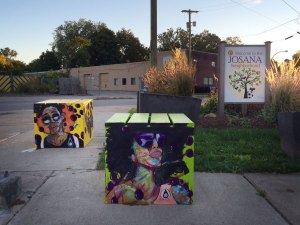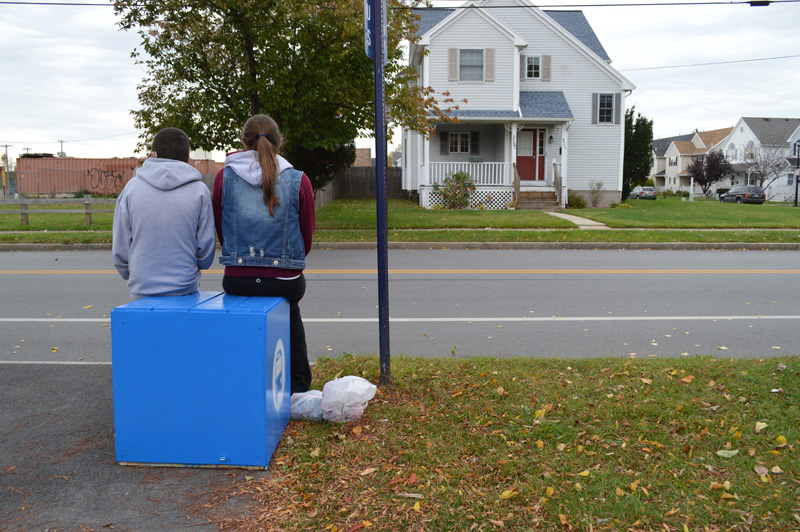By Evan Bourtis
For most people in the Rochester area, a trip to the store to pick up a few items is an errand that can be finished in less than an hour. But for Erika Jones, who uses a wheelchair and relies on paratransit services to get around, it can take two hours or longer.

“You can’t use paratransit just to go to the store and come home because paratransit rules say that you have to have at least an hour out,” Jones said. “So you’re spending probably a minimum of two hours at the store.”
That’s just one of the problems facing Rochester’s public transportation system, according to the advocacy group Reconnect Rochester, which aims at making public transportation in the city of Rochester more accessible, equitable, and sustainable. The group works directly with representatives from the city of Rochester, public transit authorities, and the Genesee Transportation Council to help fulfill the needs of all people in the city, regardless of economic background or disability.
The founder of the organization is Mike Governale, a former graphic designer who graduated from Rochester Institute of Technology. “We promote transportation alternatives, like public transportation, walking, and biking as a way to make our community more well connected and more equitable,” Governale said.
For example, often when a new roadway is being built, members of Reconnect Rochester will be advisors on how to make that area more convenient for pedestrians.
“The city of Rochester is responsible for their network and the towns are responsible for their own network and the transit authority is responsible for the buses. But they are all part of these different layers that need to connect,” Governale explained. “So, Reconnect Rochester is having discussions with these various agencies about how we can make our transportation system integrate more.”
Rochester is a car dependent community
According to Governale, Rochester is a very car dependent community, due to how easy it is to get to the city from the suburbs and because of the accessibility of the highway system. This differs from cities that are heavily reliant on public transportation, like New York City. “A lot of people drive because our community is built in a way that encourages driving. You’ve got plenty of strip malls and plenty of free parking. And it’s easy to get access to highways and there’s not a lot of congestion on the roads,” Governale added.
However, driving through a city by car offers little chance for people to interact with community members. Also, there are people in the Rochester community who are reliant on public transportation because they don’t have cars. According to a 2015 American Community Survey by the U.S. Census Bureau, 11.7 percent of homes in the city of Rochester don’t have a car, which is much higher than the national average of 4.5 percent. The same study also revealed that 8.76 percent of people in the city of Rochester use public transit to commute to work, while 6.6 percent walk and 1.2 percent rely on a bicycle. All three of these were higher than the national average.
Even though so many people in the city rely on public transportation or other alternatives to a car, Rochester’s transportation system hasn’t been significantly changed in decades, according to Governale.
Public transportation is becoming even more critical as more jobs are moving out of the city of Rochester and into the suburbs. “Getting to where the jobs are is a really big challenge, but also, if you’re a mom or dad, you have kids who rely on you,” Governale said. “You’ve got to be able to have access to healthy food, so getting to grocery stores is not always easy in the city and in poorer neighborhoods without owning a car.”
Bus services need an update
Much of the public transportation in downtown Rochester relies on the Regional Transit Service (RTS) bus system, which is owned by Rochester-Genesee Regional Transportation Authority (RGRTA). According to Governale, some features of RTS services may be inconvenient for riders, particularly for those who rely on RTS bus services for their daily commute.
According to Governale, one of the problems with the RTS bus system is how infrequent the bus services are. “If you need to get somewhere by 9 a.m., but there’s only a bus running through your area every hour or hour and a half, you might end up waiting for a long time to pick up your bus,” Governale explained.
Governale believes that the solution is running buses more frequently, which will also encourage people in the city who don’t typically ride on buses to use RTS services. “If we could find a way to run more buses so that, maybe, a bus is coming through the area every 15 minutes instead of 30 minutes, that saves a lot of time and would probably attract more people to use public transportation,” Governale added.
Reconnect Rochester is also aiming to make RTS services more convenient by adding places to sit near bus stops that lack seating. Governale said that, after he saw people sitting on the side of the road waiting for their bus, he had the idea of making the cubes for seats. Volunteers for the organization helped to build these cubes out of wood and fiberglass, as well as painting them.
One of the things that RTS is doing to fix this problem is the Reimagine RTS study, which, according to the RTS’s website, aims at getting the community’s feedback on how RTS can be more convenient. Phase one of the study, completed in February of 2018, revealed several goals that RTS hopes to achieve, including decrease customer wait time and travel time, decreasing the net cost per passenger, and encouraging community development around the transit network. The study is expected to be completed in late summer of 2018.
Biking offers an alternative to cars
Another program that Reconnect Rochester has been involved with is making Rochester’s Bike Share program more accessible. In 2017, the company Zagster (now called Pace) launched a program to create bike stations across the city, where people can pay money to rent bikes. However, these stations are more frequently found in commercial areas and wealthier city neighborhoods, rather than poorer neighborhoods where many people rely on bikes for transportation.
To fix this problem, Reconnect Rochester created a crowdfunding campaign to sponsor new bike stations, one on Hudson Avenue and another on Adams Street. “Reconnect Rochester would like to see these bikes available to everyone in our community and not just in neighborhoods that are wealthier or with people who have deep pockets to pay for these stations. We want to see bike shares in even the poorest neighborhoods,” Governale said.
Raising awareness for transportation issues
Another thing that Reconnect Rochester does is raise awareness for transportation issues. One way that the organization does this is through Rochester Street Films, a series of short films at the Little Theater about transportation. “It’s just easier to understand the complexity behind a lot of these issues if they can put a face to it and see it told through the lens of a camera,” Governale said.
Some of the past topics have included what it’s like for someone to ride their bike year-round, how people who don’t own cars get around, and how people with disabilities use public transportation. A lot of these films are produced by Reconnect Rochester, partnered with Floating Homes Films, while others are produced by people outside of the organization. “We seek stories from a variety of different people and that’s really valuable because we get to learn about the issue from a bunch of different perspectives,” Governale said.
One of the people who created a Street Film in the past was Jones, the systems advocate for the Center of Disability Rights, who is in a wheelchair. The film Jones helped to create focused on problems that she and other disabled people have experienced while trying to find public transportation in Rochester.
Paratransit services
According to Jones, a lot of disabled people rely on paratransit services, such as RTS Access, to get them to their destinations. However, many parts of Rochester’s paratransit services are inconvenient. For example, it often takes 48 hours or more of planning to organize a trip on paratransit services, so people who rely on them must plan a week in advance. “There have been instances where I’ve called two weeks in advance and they’ve said sorry, we just don’t have any rides for that time. And so I didn’t get to go anywhere,” Jones said.
Jones believes that the solution to these problems is increasing funding to paratransit services as well as encouraging collaboration between Rochester-Genesee Regional Transportation Authority and the Center for Disability Rights. Increasing funding to paratransit will allow for buses to run more frequently and people who rely on the bus services can spend less time planning.
“I think if the state were to give more funding, the transportation authority could use it to buy more buses. And more vehicles means that you have a little bit more wiggle room as far as when you can go to places,” Jones explained.
In order to help advocate for more funding, the Center for Disability Rights has met with RGRTA officials as well city, county, and town officials. Reconnect Rochester has also helped to advocate for more accessible transportation for people with disabilities. “Reconnect Rochester is at the table. There’s city representatives that are at the table. So, it’s nice to have such a collaborative feeling in this area that lets you know that the county and the city are actually listening to your issues,” Jones said.
